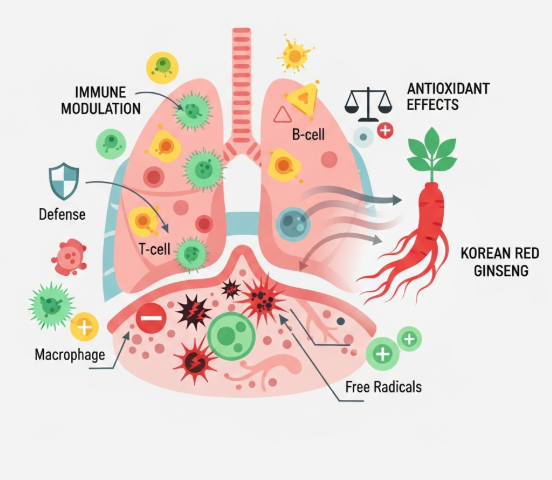🧭 Introduction: Why Lung Health Matters More Than Ever
Respiratory function is fundamental to life, yet lung health is often overlooked until problems arise. From air pollution and occupational exposure to chronic inflammation and seasonal immune stress, the respiratory system is constantly under threat.
Conditions involving chronic airway irritation, immune dysregulation, and inflammatory imbalance (such as bronchial sensitivity, environmental airway stress, or chronic respiratory fatigue) are increasingly common. While modern medicine focuses on symptom control, scientific research has begun exploring immune-modulating botanicals that support respiratory resilience, including Korean Red Ginseng (Panax ginseng C.A. Meyer).
Most people know Korean Red Ginseng as an energy tonic — but new research shows its bioactive compounds also influence lung inflammation, mucosal immunity, redox balance, and pulmonary defense signaling. While it is not a drug and does not treat disease, Korean Red Ginseng may help support healthy respiratory function through immune-modulated pathways.
🔬 Molecular Mechanisms: How Korean Red Ginseng Supports Lung Function
1️⃣ Modulating Inflammatory Pathways
Chronic airway inflammation is mediated by cytokines such as:
- IL-6
- TNF-α
- IL-1β
- IL-4 / IL-13 (Th2 cytokines)
- NF-κB activation
Ginsenosides — particularly Rg3, Rb1, Rh2, Rg5, and compound K — have been shown in experimental models to:
✔ Down-regulate NF-κB signaling
✔ Reduce pro-inflammatory cytokines
✔ Shift Th1 / Th2 balance
✔ Protect bronchial epithelial cells
✔ Reduce oxidative inflammatory damage
This suggests that Korean Red Ginseng may help support healthy inflammatory responses in the lungs — an important factor in long-term respiratory wellness.
2️⃣ Enhancing Antioxidant Defense in Lung Tissue
The lungs are highly vulnerable to oxidative injury from particulate matter, smoke, allergens, and cellular stress. Korean Red Ginseng supports antioxidant defenses by:
- Increasing SOD, GPx, and catalase
- Boosting glutathione (GSH) recycling
- Reducing ROS accumulation
- Protecting mitochondrial membranes
One of the most relevant findings is that ginseng improves redox stability in immune and lung epithelial cells, which is crucial for preventing chronic irritation and maintaining healthy breathing capacity.
3️⃣ Strengthening Mucosal Immunity
Respiratory mucosa is the body’s first line of defense. Korean Red Ginseng influences mucosal immunity through:
✔ Increased IgA secretion
✔ Improved immune cell surveillance
✔ Modulation of airway macrophages
✔ Support for epithelial barrier integrity
This makes it especially relevant for populations exposed to urban pollution, smoke, allergens, or airborne irritants.
4️⃣ Supporting Healthy Bronchial Smooth Muscle Function
Some ginsenosides support bronchodilation indirectly via:
- Nitric oxide signaling
- Calcium channel regulation
- Reduced oxidative stress
- Increased circulation to lung tissue
This may help maintain easier airflow and more comfortable breathing, especially when the bronchial environment becomes inflamed or hypersensitive.
🧪 What The Research Says (Non-Medical Summary)
📌 Animal & Cellular Studies Suggest:
- Reduced airway inflammation in allergic and induced lung models
- Lower TNF-α, IL-6, IgE, and eosinophil activity
- Improved antioxidant and immune-modulating responses
- Preservation of lung tissue and epithelial integrity
- Inhibition of excess mucus secretion in bronchial models
These findings do not mean Korean Red Ginseng treats any disease, but they highlight its potential as an immune-balancing botanical that may support healthy respiratory function.
✨ Traditional Use Meets Modern Research
For over 2,000 years, Korean Red Ginseng has been classified as a “lung-replenishing Qi tonic” in traditional medicine. Ancient literature describes it as:
- Strengthening respiratory vitality
- Supporting weak breathing
- Reducing internal fatigue
- Modulating immune weakness
- Restoring balance and resilience
Today, modern molecular research has begun validating these traditional claims — not as medicine, but through pathways involving inflammation control, immune modulation, and cellular protection.
🧠 Beyond the Lungs: Systemic & Adaptogenic Support
Korean Red Ginseng doesn’t act as a single-target herb. It exerts whole-body regulatory effects including:
- Improved mitochondrial energy
- Balanced immune response
- Better vascular circulation
- Better stress adaptation (HPA axis regulation)
- Reduced cellular damage from oxidative stress
- Hormetic activation of cellular defenses (Nrf2, AMPK)
These systemic effects indirectly benefit respiratory function because lungs are extremely sensitive to systemic inflammatory and metabolic stress.
🛑 Important Medical & Policy Notes
Korean Red Ginseng:
❌ does NOT cure, treat, or prevent bronchitis, asthma, pneumonia, inflammation, infection, or any respiratory disease
❌ is not a substitute for any medical treatment or medication
❌ should not be used to delay seeking medical care
Korean Red Ginseng may support healthy immune and respiratory function in otherwise healthy individuals, or in those seeking natural support for long-term wellness — always under professional guidance when needed.
🧬 Why Korean Red Ginseng is Different from Other Ginseng Types
| Feature | White Ginseng | Korean Red Ginseng |
|---|---|---|
| Processing | Raw, unsteamed | Steamed & aged |
| Bioactive transformation | Minimal | Converts to rare ginsenosides (Rg3, Rg5, Rh2) |
| Respiratory benefit potential | Mild | Higher (based on ginsenoside profile) |
| Immune modulation | Moderate | Stronger & more targeted |
The steaming process increases anti-inflammatory and immune-modulating compounds not found in typical white or American ginseng.
🧩 Who Might Benefit from Respiratory Support?
📌 Urban populations exposed to pollution
📌 Individuals with high oxidative stress
📌 People experiencing lifestyle fatigue & low vitality
📌 Older adults experiencing immune decline
📌 Individuals seeking preventive support for lung resilience
📌 Those with high inflammatory burden (non-medical context)
📌 People in recovery from overwork, stress or environmental exposure
📦 Recommended Forms of Korean Red Ginseng for Lung Support
- Red Ginseng Extract (liquid or capsule)
- Red Ginseng Powder
- Fermented Red Ginseng (enhanced absorption)
- Red Ginseng Tea for soothing respiratory hydration
- Red Ginseng Tonic/herbal blend
Fermented red ginseng increases availability of compound K, a ginsenoside with strong anti-inflammatory properties — and may be ideal when respiratory support is the priority.







